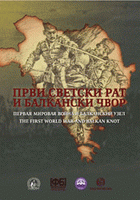Hrvatska politika uoči početka Prvoga svjetskog rata
Croatian Politics On The Eve Of The First World War
Author(s): Stjepan MatkovićSubject(s): History
Published by: Institut za savremenu istoriju, Beograd
Keywords: Croatian Politics; Parties; National Questions; World War One
Summary/Abstract: In this article, the author compares viewpoints of the Croatian political parties and adherents of various political ideas on the national question as the key problem in southeast Europe in the period before the First World War. He shows how they sought a solution for this complex problem, either through interethnic relations within the framework of the reformed Habsburg Monarchy, or through the establishment of a joint South Slav state outside the Monarchy. One of the greatest focal points of discourse was the South Slav Question, that geographically tied southern regions of Austria-Hungary (Banal Croatia, Dalmatia, Istria, Gorica, Carniola, the greater part of Carinthia, Styria, and Bosnia and Hercegovina). Besides this, South Slavs lived outside of Austria-Hungary in neighbouring states (Serbia, Montenegro, as well as Bulgaria) that had gained independence at the Congress of Berlin. With regard to that question, even though most politicians accepted the notion of South Slav solidarity, they still hoped to achieve their goals within the context of the Austria-Hungary in spite of dissatisfaciton with its dualistic politics. A new political direction emerged after the annexation of Bosnia and Hercegovina and the outbreak the First Balkan War. The Kingdom of Serbia gained importance after the two Balkan wars (1912–1913). During that period, the youth movement fundamentally changed its viewpoints, becoming the advocate of integral Yugoslav and Serbo-Croatian nationalism through which Serbia became to play a „Piedmontese role“ in the South Slav region and contribute to the collapse of the Habsburg Empire. On the eve of the First World War, the South Slav Question became one of the key obstacles for the stability not only of Southeast Europe, but also of Central Europe. Within Austria-Hungary, peoples of the South Slav regions persistently demanded a reform of the internal order, that is to say either a revision of the Croatian-Hungarian Compromise or the creation of an entirely new type of constitutional organization. However, there was no unified view in search of a formula, that would satisfy varied interests of different ideologies and ethnic groups. With the outbreak of the First World War, different concepts found themselves split up. The most outspoken enemies of the Habsburg Crown formed the Yugoslav Committee in London under auspices of the Entante. The main goal of this Committee was a unification of the Habsburg South Slav lands with the Kingdom of Serbia. On the other hand, dominant politicians within the Monarchy loyally carried out their public task. Though they expressed concerns about the imperial politics of the Habsburg dynasty and ruling circles, they were uneasy with radical changes and hoped for the introduction of a new compromise. However, when the First World War ended, the perceptions of these politicians changed completely. Under newly arisen circumstances, they gave up the model of reforming the Habsburg Monarchy in favour
Journal: Zbornik radova Instituta za savremenu istoriju
- Issue Year: 2014
- Issue No: 12
- Page Range: 191-200
- Page Count: 10
- Language: Croatian
- Content File-PDF

